June 2025 Newsletter

California 2025-26 State Budget Misses Mark on Child, Immigrant Health Equity
The 2025-26 California state budget agreed to by Gov. Gavin Newsom and the Legislature continues to reflect a looming uncertainty from the federal government – and fails to fully protect the children and families in California who need our support and commitment the most.
It’s this uncertainty that presents an opportunity for California to lead the way in standing firm in our shared values of dignity, freedom and the chance at a brighter future. While this budget deal is slightly less harmful to our immigrant communities than what the Governor proposed in May, it’s still not good enough for the millions of immigrants who live, work and pay taxes in our state.
After making historic strides last year in opening Medi-Cal eligibility to anyone regardless of immigration status, this budget takes away that promise of the security of health care. The state will now freeze Medi-Cal enrollment for undocumented Californians ages 19-59 starting in January 2026, and undocumented adults who are able to keep their coverage will be required to pay a new $30 monthly premium starting in January 2027. Adding these restrictions will leave people uninsured, shifting costs to hospital uncompensated care, and making health care more expensive for everyone. These decisions will not help in the long run.
“When nearly half of California’s 9 million children are part of an immigrant family, and immigrants are being targeted and scapegoated by our federal government, now is not the time to pull back on our support,” said TCP President Mayra E. Alvarez. “Too many children are experiencing and witnessing the troubling actions and rhetoric surrounding immigrant families – no doubt traumatizing them for decades to come. We must do better to show them that California stands for unity, health and dignity for all.”

Tell Congress: Protect Medicaid/Medi-Cal NOW

Congress continues to decide what to slash from the federal budget. The Senate recently released its plan, which goes further in making cuts to Medicaid than the House did in its bill, which already cuts at least $700 billion from Medicaid to fund tax breaks for the wealthy. The Senate plans to vote on their bill before July 4.
Cuts to Medicaid’s budget at the federal level mean a lot less money going to states, including to California – where over five million children rely on Medi-Cal.
Don’t let Congress strip care from California’s kids. Tell your representatives in Congress to protect Medicaid before it’s too late.
Get more data and tools on our Protect Medicaid and Medi-Cal webpage.

A Child is a Child: Celebrate Children in Immigrant Families, LGBTQ+ Youth

Children, no matter their identity or background, deserve equitable access to health care, safe environments, and adults that protect them from harmful policies.
Created in partnership with the Children Thrive Action Network and California Immigrant Policy Center, and Equality California, California LGBTQ Health and Human Services Network, and Health Access California, respectively, these two fact sheets give a clearer picture of the unique health inequities and protective factors of children in immigrant families and LGBTQ+ youth.
As anti-immigrant and anti-trans rhetoric and actions rain down from the federal government, affecting the daily lives of our children and families, now is the perfect time to lean into Immigrant Heritage Month and Pride Month in June. Use these toolkits to share information and uplift messages of support and respect on social media.
New CTAN Brief: Federal Budget Reconciliation Bill Will Harm Children in Immigrant Families
As a part of the Children Thrive Action Network, The Children’s Partnership supported the creation of a new brief on the U.S. House reconciliation package. This legislation seeks to drastically cut funding for Medicaid and SNAP, and bar eligibility to health coverage, food assistance, and tax credits – instead, funneling that money to fund $1.1 trillion in tax breaks for the wealthy, with added costs to fund immigration enforcement actions that separate families and traumatize children. These policies are likely to increase child poverty; weaken Medicaid and restrict SNAP; increase fees for asylum seekers, sponsors of unaccompanied children, and children who are applying for Special Immigrant Juvenile Status; and fund family detention. See the full brief, as well as additional briefs linked below on the impact of the bill for different issue areas.
Fact Sheets on Medicaid and SNAP Data Sharing
You may have seen the AP article reporting that the U.S. Department of Heath and Human Services, which oversees the Centers for Medicare and Medicaid Services, shared the personal data of people enrolled in Medicaid in California, Illinois, Washington and the District of Columbia with the Department of Homeland Security for immigration enforcement purposes. We strongly condemn this action.
Protecting Immigrant Families and National Immigration Law Center have drafted a helpful What Advocates Need to Know fact sheet that includes:
- The state of play
- Suggested community messages
- Suggested actions for state Medicaid and SNAP agencies, and
- An appendix that provides more detail on federal privacy protections and protections for non-applicants.
To inform our community members who are currently enrolled in Medi-Cal, members of the Health4All Steering Committee have developed an FAQ in English and Spanish.
The goal of this FAQ is to inform our communities about the facts and allow them to make an informed decision about their Medi-Cal status based on their own situation. Additionally, the California Department of Health Care Services added information about the CMS data sharing on their official FAQ website.
CMS Issues Final Rule Making DACA Recipients Ineligible for ACA
The Centers for Medicare & Medicaid Services (CMS) has issued a final rule, once again making DACA recipients ineligible for ACA coverage.
From the CMS fact sheet:
CMS is finalizing amendments to the definition of “lawfully present” to exclude DACA recipients, returning to the interpretation adopted in the 2012 Interim Final Rule (77 FR 52614). This change will make DACA recipients ineligible to enroll in a Qualified Health Plan (QHP) through the Marketplace, for premium tax credits, APTC, and cost-sharing reductions (CSRs), and for Basic Health Programs (BHPs) in states that elect to operate a BHP, reversing the 2024 DACA Rule.
The exclusion takes effect 60 days after the rule is officially published.
Read the press release here.

We’re Hiring! Vice President of People, Finance and Operations
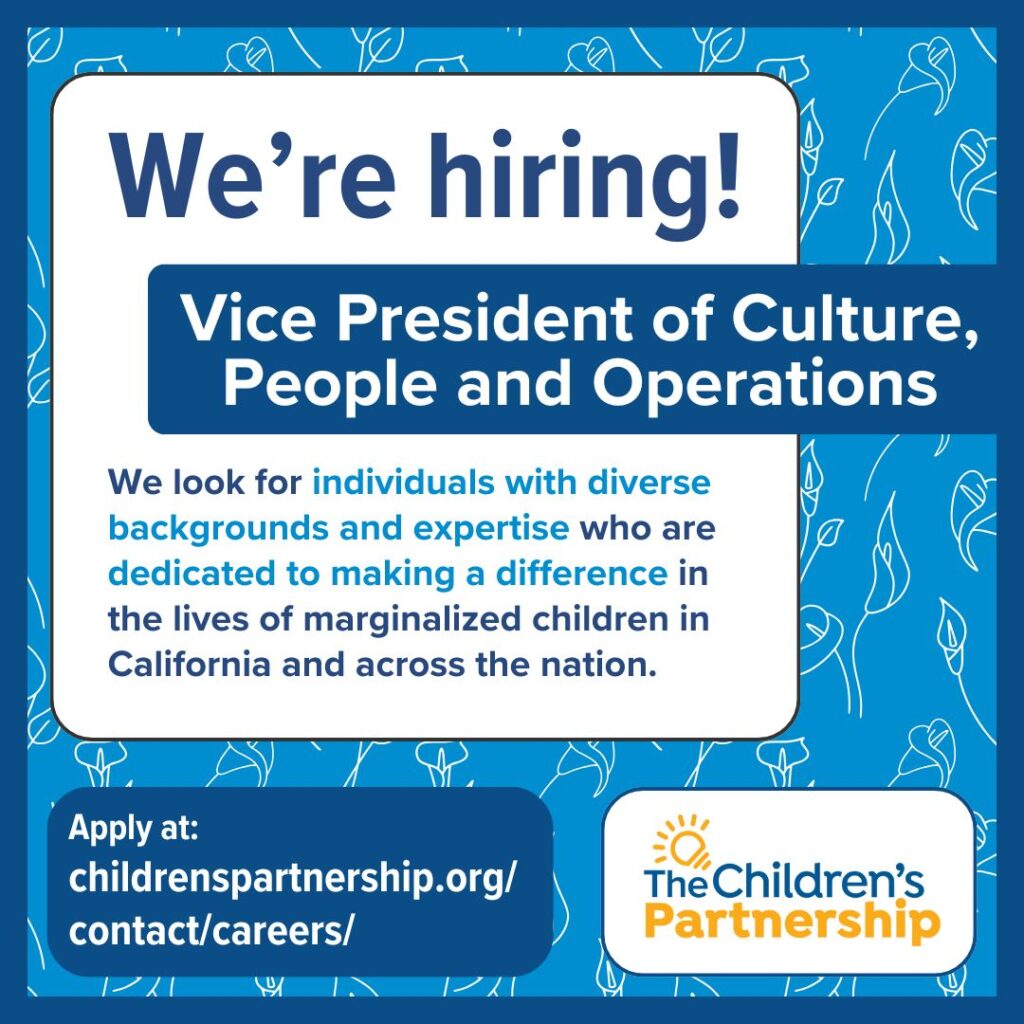
Are you a systems thinker with a heart for people and a head for strategy? Do you believe that real organizational health comes from a culture of trust, transparency and care – backed up by solid systems, transparent decision-making and strong financial processes? If so, we want you on our team.
The Children’s Partnership is a California-based advocacy organization working to advance child health equity through bold policy, innovative research and authentic community engagement. We believe that kids deserve a fair shot at a healthy, bright future—and we’re looking for a Vice President of Culture, People and Operations, who’s ready to help us make that happen.
You’ll be the heartbeat of TCP’s internal operations, ensuring our people, processes and resources are aligned for impact. You’ll champion an inclusive, equitable culture where staff feel seen, heard and supported, and you’ll build the kind of infrastructure that helps big ideas take flight. As VP, you’ll lead HR, finance, technology and administration with a steady hand and a strategic eye—making sure our systems not only work but work for our people.
Bringing Up California Launches Coalition at Inaugural Summit
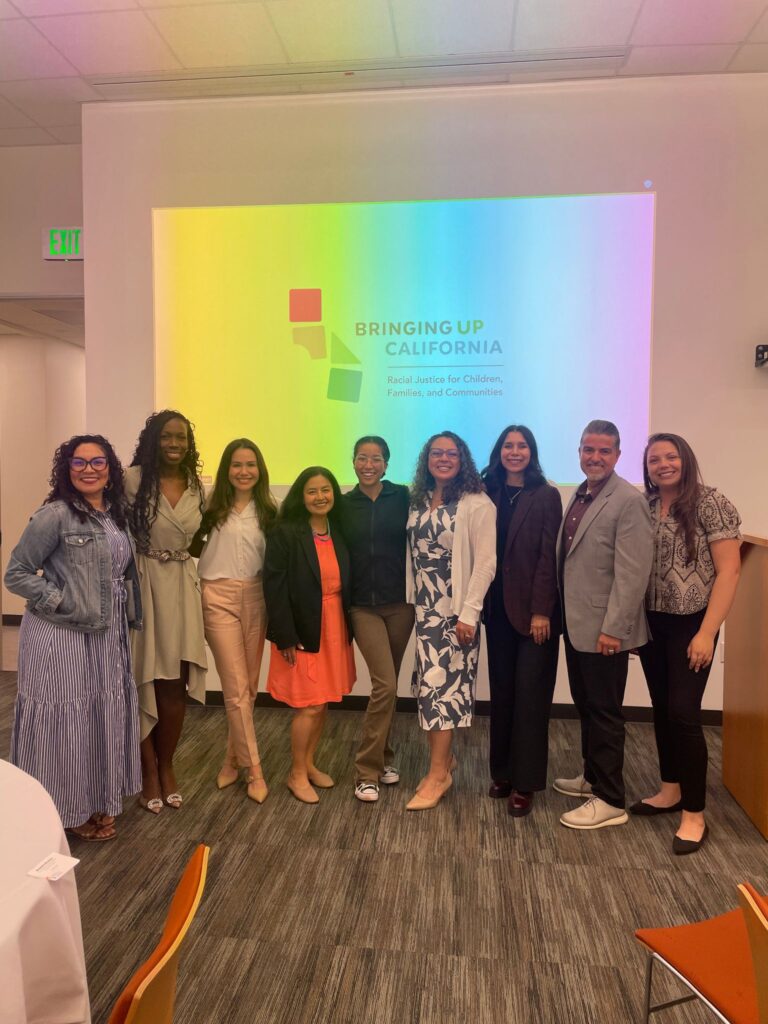
Bringing Up California, formerly the Whole Child Equity Partnership, held its inaugural summit on June 3 in Oakland, introducing the coalition to more than 100 community leaders, policy makers, families and advocates. The day-long event brought like-minded people together to connect, reflect and build the future for California’s youngest children.
Throughout the day, attendees explored the coalition’s core policy priorities for prenatal-to-3 systems change; participated in dynamic panels, including an inspiring keynote from former CMS administrator Chiquita Brooks-LaSure; and engaged in small-group table talks that fostered community-led ideas.
Participants leaned into the urgency of the moment, naming the challenges that persist for children and families of color, especially in the face of rising political threats, resource gaps and shifting federal policies. From immigration enforcement to changes in Medicaid and education access, speakers highlighted the hidden consequences of federal decisions that ripple through California communities, often without warning.
The summit closed with a powerful call to action, which included bringing attention to Bringing Up California priorities, such as protecting Health4All and HOPE Accounts, and supporting California’s early care and education providers through rate reform. Together, we must be a united front for our babies by encouraging advocates, families and community leaders to continue building a California that’s the best state to have, raise and be a child.
Want to get involved? Join our listserv to receive updates on our work, upcoming events, and ways to advocate for equity and justice in early childhood policy.
Blog Post: School Was My Safe Haven—Let’s Make Sure It Stays That Way for Every Child
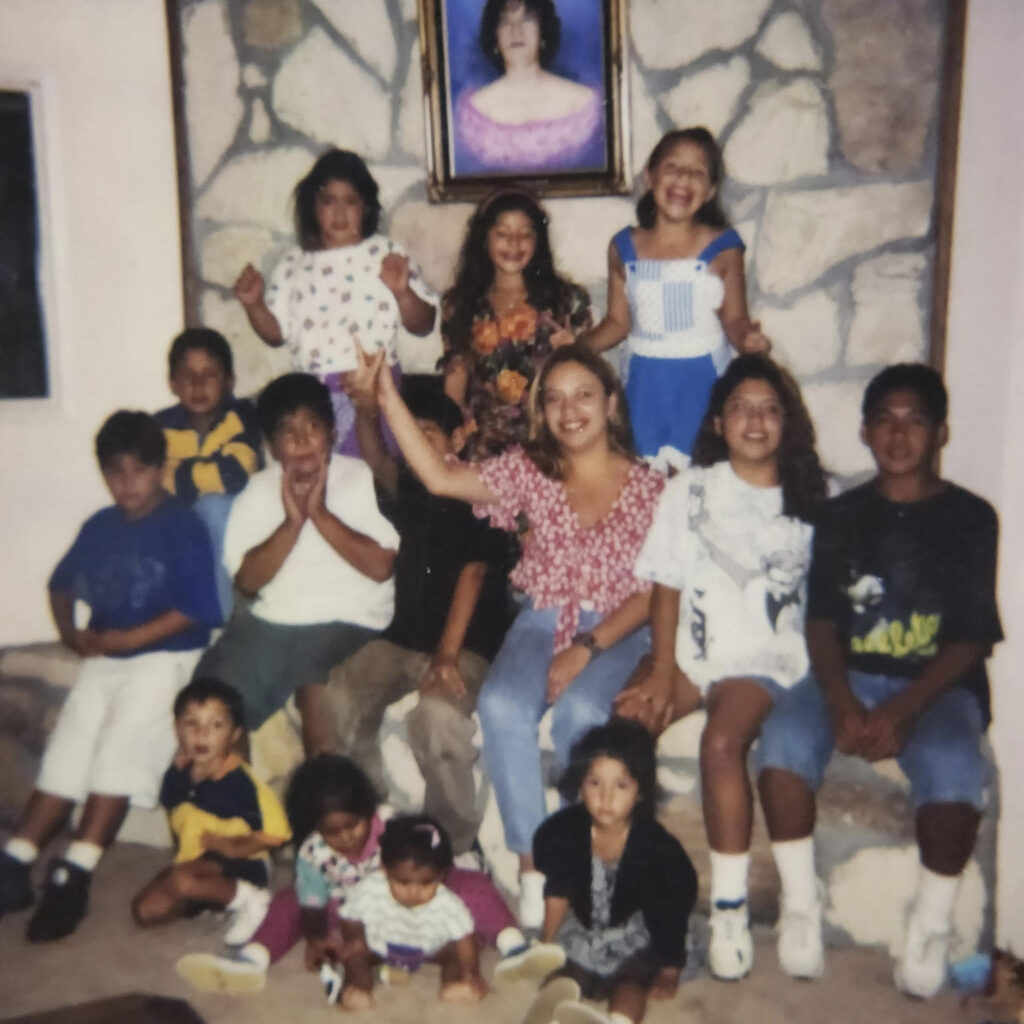
What if one of the only safe places your family trusted for you as a child—your school, library or neighborhood park—suddenly became a place of risk and fear? For many immigrant families in California today, this is the new reality.
As an immigrant child whose parents worked long hours to keep our family afloat, school offered me more than lessons; it gave me belonging, stability, and the chance to focus on myself and my own growth.
Back then, I didn’t worry that immigration agents would show up at school. My parents—despite all the caution that comes from being new to this country—largely trusted school as a safe space where they could leave me without fear. While that trust took time to grow, it was precious to me because as a child who had to learn responsibility early—helping at home, looking after family—school gave me freedom and the chance to imagine who I could become.
Today, that sense of safety is no longer guaranteed. Across California and the country, fear of immigration enforcement has crept into the very places where children should feel safest: schools, early learning and child care centers, health clinics, libraries, parks, after-school programs and places of worship.
TCP Educates on Proposition 1 Opportunities for Children & Youth
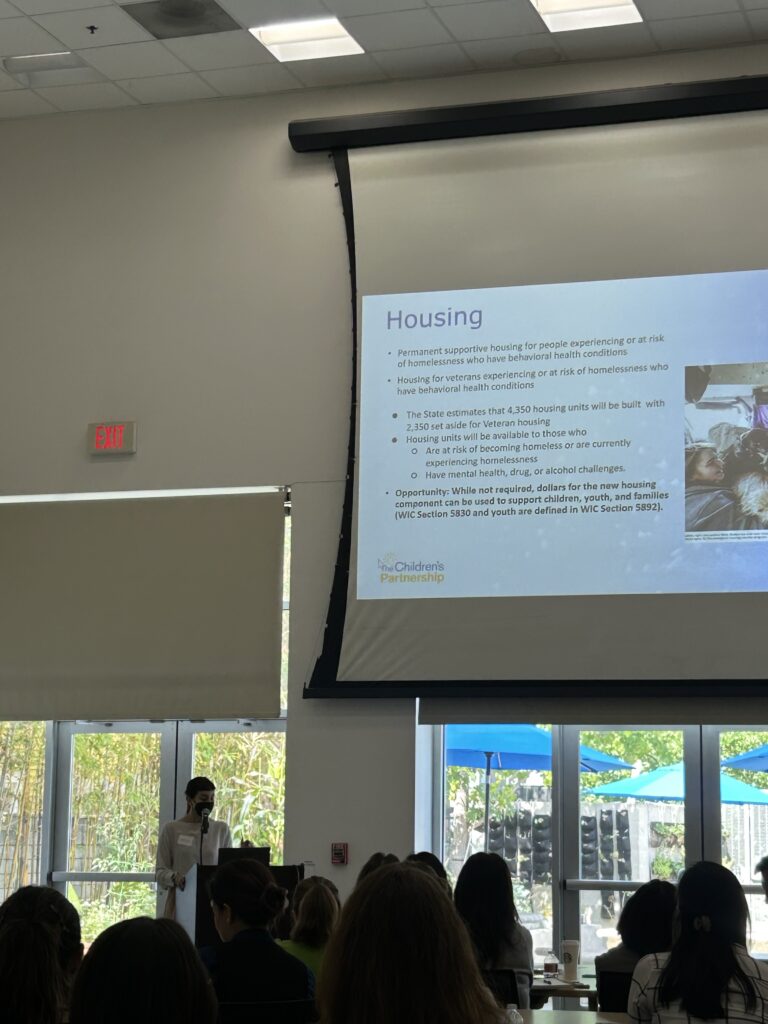
Angela M. Vázquez, TCP’s advocacy director of mental health, attended the Youth Behavioral Health Convening on June 26 with the Los Angeles County Office of Child Protection to deliver a presentation on Proposition 1 funding available for child and youth-serving programs. Prop 1, also known as the Behavioral Health Services Act, released guidance for funding opportunities with a focus on services and organizations that promote prevention and early intervention, housing support, and/or youth engagement or a focus on children ages 0-5.
Additionally, TCP, Children Now, and the California Alliance of Child & Family Services sent letters to 13 county boards of supervisors this month to share opportunities to improve the behavioral health of children and youth under Prop 1. While most of the state-level public communications and draft guidance surrounding the implementation of Prop 1 have focused on adults experiencing homelessness, we focus on uplifting how Prop 1 can continue to support children, youth and families. We recommend that each county board of supervisors review their County Integrated Plan to ensure it includes all child-related components that are required and/or available to counties under Prop 1.
At a time when state and local budgets have reduced spending for several mental health services and programs, Proposition 1 BHSA funding serves as an opportunity to bridge several gaps to advance children’s mental health and well-being.
TCP Presents on Safe Spaces to CA Early Childhood Policy Council
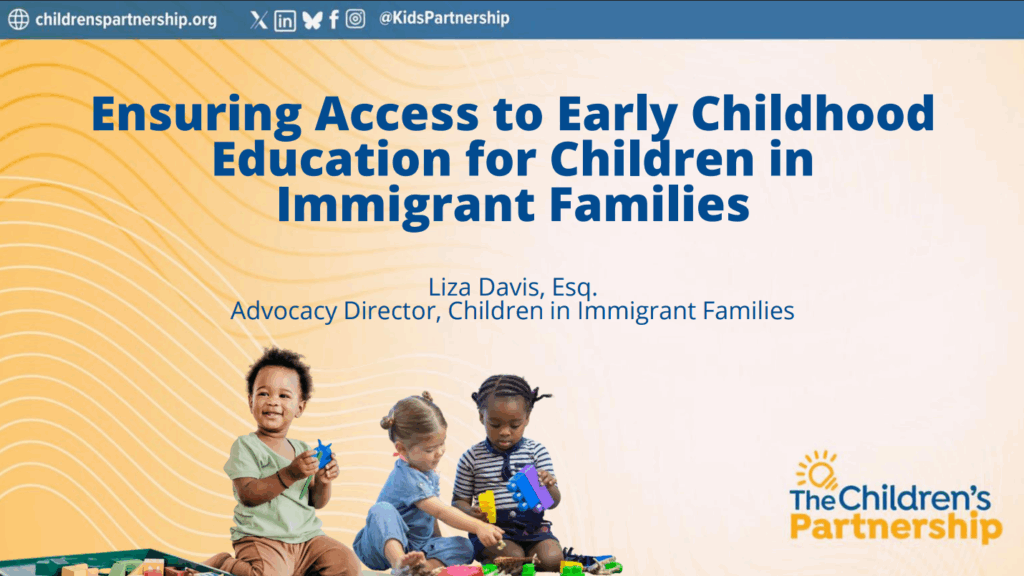
Moderated by TCP President Mayra E. Alvarez, the May meeting of the California Health & Human Services Agency Early Childhood Policy Council focused on addressing federal immigration action in early learning spaces. Liza M. Davis, TCP’s advocacy director of children in immigrant families, gave a presentation on policy updates affecting access to early childhood education. The meeting also included a panel discussion with state leaders from the California Attorney General’s Office, Department of Education, and Department of Social Services. The meeting was attended by nearly 400 stakeholders and provided an opportunity for providers and ECE professionals to share the importance of this topic for their workforce and voice their concerns and need for support.
To learn more, you can access meeting materials on the ECPC website. For resources and more information on this topic, visit allinforsafeschools.org.
TCP Contributes to SoCal Grantmakers Conversation on Protecting Medi-Cal
On June 12, Mayra E. Alvarez joined the second part of a critical two-part conversation hosted by SoCal Grantmakers on protecting California’s Medicaid program, Medi-Cal. The session centered the on-the-ground work of community partners in Southern California, with partners sharing what they anticipate over the next 3-12 months and how they’re preparing to respond. Funders heard directly from grantees and partners, gaining a clearer view of the evolving landscape and how philanthropy can align its strategies to support access to care for all Californians.

Liza M. Davis, Eva Rivera to Present at 2025 Innovation Summit
TCP’s Liza M. Davis, advocacy director of children in immigrant families, and Eva Rivera, advocacy director of early childhood development, will be presenting at the 2025 Innovation Summit taking place August 27-29 in Pacific Grove, CA. The Innovation Summit is hosted by the Child Care Resource Center and Connecting California Families for resource and referral agencies that work directly with child care providers, centers and families across California. Liza and Eva will present on ensuring access to early childhood education for all students and families, with a focus on the impact of immigration policy changes, their impact on ECE, and how early childhood education providers can play a key role in fostering safe and welcoming environments where all children can learn and grow.
9th Annual Wellness Together Conference

The 9th Annual Wellness Together Conference, held in partnership with the California Department of Education, will be held September 29-October 1 at the San Diego Convention Center. The conference is a curated experience to connect, equip and inspire the best minds in education and mental health for meaningful impact.
This year’s keynote speakers include:
- Dr. Vivek Murthy, 19th and 21st Surgeon General of the United States
- Dr. John B. King Jr., 10th U.S. Secretary of Education
- Rainn Wilson, actor and author of Soul Boom
- Anya Kamenetz, longtime NPR education correspondent
- Dr. Anna Malaika Tubbs, sociologist and New York Times bestselling author
- Michael Tubbs, the youngest mayor of any major city in the United States

TCP Comments on California State Budget to KALW, Spectrum News 1
TCP President Mayra E. Alvarez and Sarah Dar, TCP Vice President of Policy and Advocacy, were both interviewed this month about the California state budget. Dar was a guest on the KALW Bay Area public radio show Your Call, where she and others discussed the cuts included in Gov. Gavin Newsom’s May budget revision, which threatened to leave hundreds of thousands of vulnerable Californians without essential health care. Spectrum News 1 covered a press conference in front of the Capitol in Sacramento where Alvarez and other leaders from community-minded organizations urged lawmakers to include Medi-Cal for all undocumented immigrants in the state budget. “The idea that undocumented Californians should have access to health care coverage is not only an investment in their well-being, it’s an investment in the well-being of all of us,” she said.
Alvarez Expresses Concern to KPBS About COVID-19 Vaccine Access
Mayra E. Alvarez told KPBS San Diego that updated guidelines from Health and Human Services Sec. Robert F. Kennedy Jr. – that healthy children, pregnant women, and most adults under 65 are no longer routinely recommended to receive the COVID-19 vaccine – may start a slippery slope with insurers where they decide to stop covering the vaccine. “It’s almost $200 to pay out of pocket for a vaccine,” she said. “That $200 can help pay rent, to pay for child care costs, to pay for food.”
